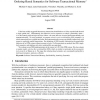Free Online Productivity Tools
i2Speak
i2Symbol
i2OCR
iTex2Img
iWeb2Print
iWeb2Shot
i2Type
iPdf2Split
iPdf2Merge
i2Bopomofo
i2Arabic
i2Style
i2Image
i2PDF
iLatex2Rtf
Sci2ools
107
click to vote
OPODIS
2008
2008
Ordering-Based Semantics for Software Transactional Memory
It has been widely suggested that memory transactions should behave as if they acquired and released a single global lock. Unfortunately, this behavior can be expensive to achieve, particularly when-as in the natural publication/privatization idiom--the same data are accessed both transactionally and nontransactionally. To avoid overhead, we propose selective strict serializability (SSS) semantics, in which transactions have a global total order, but nontransactional accesses are globally ordered only with respect to explicitly marked transactions. Our definition of SSS formally characterizes the permissible behaviors of an STM system without recourse to locks. If all transactions are marked, then SSS, singlelock semantics, and database-style strict serializability are equivalent. We evaluate several SSS implementations in the context of a TL2-like STM system. We also evaluate a weaker model, selective flow serializability (SFS), which is similar in motivation to the asymmetric lock a...
Distributed And Parallel Computing | OPODIS 2008 | Selective Strict Serializability | Single Global Lock | Strict Serializability |
Related Content
| Added | 30 Oct 2010 |
| Updated | 30 Oct 2010 |
| Type | Conference |
| Year | 2008 |
| Where | OPODIS |
| Authors | Michael F. Spear, Luke Dalessandro, Virendra J. Marathe, Michael L. Scott |
Comments (0)

